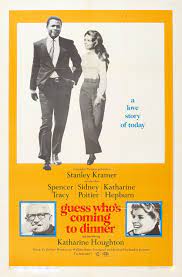GUESS WHO'S COMING TO DINNER
US, 1967, 109 minutes, Colour,
Spencer Tracy, Katharine Hepburn, Sidney Poitier, Katharine Houghton, Cecil Kellaway, Beah Richards, Virginia Christine.
Directed by Stanley Kramer.
 Guess Who's Coming to Dinner was a most popular film and a great money maker that will go the rounds again and again. In fact, along with A Patch of Blue and To Sir With Love, it is one of the most popular films highlighting the race problems in the United States. So many people saw it, enjoyed it, appreciated its message, that it probably helped to soften a lot of prejudice which angry and satirical films do not.
Guess Who's Coming to Dinner was a most popular film and a great money maker that will go the rounds again and again. In fact, along with A Patch of Blue and To Sir With Love, it is one of the most popular films highlighting the race problems in the United States. So many people saw it, enjoyed it, appreciated its message, that it probably helped to soften a lot of prejudice which angry and satirical films do not.
Critics were generally against it, although it was nominated for many Oscars - winning the best original screenplay (by William Rose (Genevieve and It's a Mad World) and a second Oscar for Katharine Hepburn. Critics saw it as too unreal, too noble and too sentimental.
It is; yet this modern American fairytale is what many people have needed to remind them that the race problem is real enough. The film wants them to make the jump from Sidney Poitier to any black man, from Spencer Tracy to any white. The main stars go through the film giving it their best and many audiences watched Katharine Hepburn's face as Spencer Tracy gives his final rock of America speech in the film which she knew and we now know was to be his last. Stanley Kramer made tough films with a message in the 50's - The Men, The Defiant Ones. He became more spectacular and popular in the 60's, moving from Judgment at Nuremburg to It's a Mad World, Ship of Fools, The Secret of Santa Vittoria, R.P.M. and Bless the Beasts and Children.
1. What kind of mood was set by the opening - jet, airport and the theme song: 'you 've got to give a little, live a little .. that's the story of, that's the glory of love'?
2. The film was about the engagement and marriage of two Americans. Although it was a modern fairy tale, it had a lot to say on the beliefs, actions and prejudices of Americana, How do you think this film contributed to the improvement of race relationships?
3. Did you find the story too unreal, the conditions too good -wealthy people, qualifications etc. - and the whole thing too artificial and sentimental (as did many critics), or were you satisfied?
4. Can you see haw Dr. John fell in love with Joanne and why they Wanted to get married so quickly? Was Joanne a sensible girl or did she seem too giddy and irresponsible?
5. Comment on the reactions of each set of parents to the news. Why were they taken aback? What was their main cause for concern and worry?
6. The film used many devices to bring home to the audience the basic equality of all humans -e.g. the praising of John as a man, as doctor and then the parent seeing him and experiencing a conflict of ideas and feelings. How successful were these dramatic devices?
7. The white parents were liberals who had preached equality for years. Why were they so hesitant? What does this say about the need for assimilating ideas and principles with feelings?
8. Did the engaged couple put too much pressure on the parents? If John could not get full consents, he would not marry. Was this an ultimatum on the parents?
9. Why was Tilly the maid so prejudiced against John?
10. Why was Hillary so 'bitchy' and snooping? Why was Katharine Hepburn's giving her 'comeuppance' a high point in the film - and yet so many people share Hillary 's assumptions? Did Stanley Kramer manoeuvre audience feeling at this stage?
11. How did Monsignor Ryan appear at this stage - how well did he use his cliches, experience and commonsense? What influence did he have on the parents?
12. How did John and Joanne 's friends at the club provide a contrast of generations with the parents - in ideas and permissiveness?
13. Why was John afraid to tell his parents about the marriage? Did their reactions differ from Joanne 's parents?
14. What were the high points of the final confrontations (did you enjoy this part of the film?
- the mothers and their awareness of happiness;
- the examining of all problems consequent on a mixed-race marriage; opinion, the children, etc.;
- John telling his father he loved him deeply but owed him nothing and he had his own life to lead;
- John's mother saying that the old forget and that they lose their passion and then make decisions for -their children
- Spencer Tracy 's final summing up (did it make a difference that it was Tracy who was making this speech?)
15. How much good did this film do? Why?